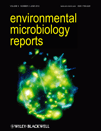
Environmental Microbiology Reports
Scope & Guideline
Exploring the Microbial World of Environmental Interactions
Introduction
Aims and Scopes
- Microbial Ecology:
Studies the relationships between microorganisms and their environments, exploring community dynamics, interactions, and ecological roles. - Biogeochemical Cycles:
Investigates the role of microbes in nutrient cycling, including carbon, nitrogen, and sulfur cycles, and their implications for ecosystem functioning. - Environmental Biotechnology:
Focuses on the application of microbial processes for environmental remediation, bioremediation of pollutants, and sustainable practices. - Microbial Physiology and Adaptation:
Examines how microorganisms adapt to various environmental stressors, including temperature, salinity, and pollution, highlighting their metabolic versatility. - Pathogen-Microbe Interactions:
Explores the interactions between pathogens and microbiomes, including resistance mechanisms and the impact on health and disease. - Novel Microbial Taxa:
Reports on the discovery and characterization of new microbial species, emphasizing their ecological roles and potential applications.
Trending and Emerging
- Microbial Responses to Climate Change:
An increasing number of studies examine how climate change affects microbial community structure, function, and resilience, emphasizing the need to understand microbial roles in climate-related processes. - Antibiotic Resistance and Microbial Resistomes:
Research on antibiotic resistance mechanisms and the characterization of resistomes in various environments is gaining traction, reflecting global health concerns and the need for effective management strategies. - Microbiome Functionality in Ecosystem Health:
There is a growing interest in understanding the functional roles of microbiomes in ecosystem health, including their contributions to plant growth, soil fertility, and resilience to environmental stressors. - Integrated Approaches to Environmental Monitoring:
Emerging methodologies that integrate metagenomics, transcriptomics, and environmental monitoring to assess microbial contributions to ecosystem processes are becoming more prevalent. - Microbial Bioremediation Innovations:
Innovative applications of microbial processes for bioremediation of pollutants, particularly in response to plastic waste and other emerging contaminants, are increasingly featured in recent publications.
Declining or Waning
- Traditional Cultivation Techniques:
There has been a noticeable decline in studies focused solely on traditional microbial cultivation methods, as the field shifts towards more advanced genomic and metagenomic approaches. - Basic Taxonomic Surveys:
Basic taxonomic surveys that do not incorporate functional or ecological context are becoming less common, as researchers increasingly seek to link taxonomy with ecosystem function. - Single-Species Studies:
Research focusing on single species without considering community interactions is declining, as there is a growing recognition of the importance of microbial communities and their interactions. - Static Laboratory Studies:
Laboratory studies that do not simulate dynamic environmental conditions are less prevalent, in favor of research that reflects real-world ecological complexities.
Similar Journals

mLife
Unveiling the mysteries of microorganisms through rigorous research.Welcome to mLife, an emerging journal at the forefront of microbiological research published by the esteemed WILEY in China. With its ISSN 2097-1699 and E-ISSN 2770-100X, mLife serves as a vital platform for scholars and practitioners aiming to advance their understanding of microbial sciences. With an impressive Q2 ranking in the Microbiology category and a Scopus rank of 143 out of 182, mLife is quickly establishing itself as a valuable source of cutting-edge research. The journal, covering a range of innovative topics from immunology to environmental microbiology, provides an engaging venue for disseminating high-quality research findings aimed at addressing real-world challenges. Authors and readers alike benefit from its accessibility features that encourage scholarly collaboration and information sharing. As we converge on the rich microbial landscapes from 2022 to 2024, mLife is committed to fostering a community dedicated to rigorous research and impactful discoveries.
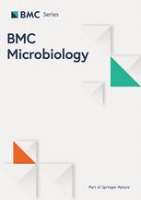
BMC MICROBIOLOGY
Pioneering discoveries in microbiology, accessible to all.BMC Microbiology is a leading open access journal published by BMC, dedicated to advancing the field of microbiology since its inception in 2001. With an ISSN of 1471-2180, this journal provides a vital platform for researchers, professionals, and students to share and access high-quality research and innovation in both general and medical microbiology. Based in the United Kingdom, BMC Microbiology holds a commendable Q2 ranking in both various microbiological categories according to the 2023 Scopus rankings, indicating its strong influence in the microbiological community, with a rank of #47 out of 140 in Medical Microbiology and #62 out of 182 in general Microbiology. The journal's commitment to open access ensures that groundbreaking research is freely available to facilitate collaboration and knowledge sharing among the global community of microbiologists. With a focus on publishing original research, reviews, and case studies, BMC Microbiology plays a critical role in disseminating information that can impact health and environmental conditions around the world.
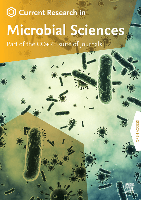
Current Research in Microbial Sciences
Connecting Researchers with Cutting-edge Microbial DiscoveriesCurrent Research in Microbial Sciences is a distinguished peer-reviewed journal published by Elsevier, focusing on the dynamic and rapidly advancing fields of microbiology and infectious diseases. With an ISSN of 2666-5174, this journal has established itself as an essential resource for researchers, professionals, and students alike, offering the latest findings and insights from 2020 to 2024. The journal holds a significant position in the academic landscape, achieving a Q2 ranking across multiple categories, including Immunology and Microbiology, Infectious Diseases, and Medical Microbiology, demonstrating its impact in these critical areas of study. With impressive Scopus rankings—such as being placed in the 94th percentile for Immunology and Microbiology—current research is well-supported by a thriving scientific community. Although the journal is not open access, it serves as a vital platform for disseminating high-quality research and fostering collaboration within the microbial sciences. Engaging with this journal enables professionals and researchers to stay abreast of innovations and contribute to the collective body of knowledge that shapes our understanding of microbial interactions and infectious diseases.

WORLD JOURNAL OF MICROBIOLOGY & BIOTECHNOLOGY
Advancing the Frontiers of Microbial InnovationWORLD JOURNAL OF MICROBIOLOGY & BIOTECHNOLOGY, published by Springer, serves as a pivotal forum for advancing the fields of microbiology and biotechnology since its inception in 1990. Located in the Netherlands, this esteemed journal has secured a prominent position in the academic landscape, recognized for its strong impact factor and prestigious Q2 category rankings across disciplines such as Applied Microbiology, Biotechnology, and Physiological Sciences. Researchers and professionals utilize this journal to disseminate innovative findings and explore emerging technologies that are transforming the scientific landscape. With a robust submission rate and high visibility among the academic community, the journal fosters interdisciplinary collaboration, encouraging discussions that bridge gaps between theory and practical applications. As it converges into 2024, the WORLD JOURNAL OF MICROBIOLOGY & BIOTECHNOLOGY continues to be a vital resource for scholars aiming to enhance our understanding of microbial processes and biotechnological advances.
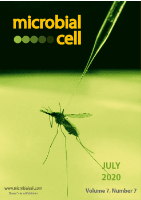
Microbial Cell
Fostering collaboration in microbial research.Microbial Cell is a distinguished open-access journal published by SHARED SCIENCE PUBLISHERS OG, focusing on the dynamic fields of microbiology, biochemistry, and molecular biology. Since its establishment in 2014, Microbial Cell has been at the forefront of disseminating cutting-edge research essential for advancing our understanding of microbial functions and interactions. With a commendable impact factor and ranking in the top quartiles (Q1 and Q2) across several categories, including Applied Microbiology and Biotechnology and Parasitology, this journal serves as an invaluable resource for researchers, professionals, and students alike. It features a comprehensive scope that encompasses the latest findings in genetics, cell biology, and virology, facilitating the academic community's access to high-quality peer-reviewed work. Microbial Cell not only contributes to advancing microbial sciences but also fosters an inclusive platform for knowledge sharing and collaboration in the scientific community.

ISME Communications
Connecting Ideas, Cultivating Knowledge in Microbial EcologyISME Communications is an esteemed journal dedicated to advancing the field of environmental microbiology and its multifaceted intersections with ecology, biogeochemistry, and biotechnology. Published by SpringerNature, this journal aims to disseminate cutting-edge research and innovative insights that address pressing global challenges through interdisciplinary approaches. With a commitment to open access, it provides a platform for researchers, professionals, and students to share their findings widely, fostering collaboration and knowledge exchange. Although the journal is relatively new, its potential for impactful contributions is substantial, making it an essential resource for anyone interested in the microbial processes that underpin ecosystem functioning and sustainability. The journal not only prioritizes the rigorous peer-review process but also supports the academic community's pursuit of excellence in environmental science.

JOURNAL OF MICROBIOLOGY
Transforming knowledge into solutions for environmental challenges.JOURNAL OF MICROBIOLOGY, published by the Microbiological Society Korea, is a prestigious peer-reviewed journal dedicated to the advancement of knowledge in the fields of microbiology, applied microbiology, and biotechnology. Established in 1996, this journal serves as a vital platform for researchers and professionals from around the globe to disseminate their findings and engage in multidisciplinary discussions pertaining to microbial sciences. With an H-index that reflects its impact, the journal holds a commendable Q2 ranking in key categories including Applied Microbiology and Biotechnology, as well as Medicine (Miscellaneous), which underscores its significance in the academic community. Despite being a subscription-based journal, the JOURNAL OF MICROBIOLOGY aims to contribute to the understanding of microbial processes and their applications, facilitating advancements that are essential in health, industry, and environmental sciences. Researchers, students, and practitioners are encouraged to explore this rich resource for the latest research and trends in microbiology.
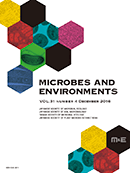
MICROBES AND ENVIRONMENTS
Exploring the Intricate Dance of Microbes and Their EnvironmentsMICROBES AND ENVIRONMENTS is a prominent academic journal dedicated to advancing the field of microbial ecology, published by the Japanese Society of Microbial Ecology. Since its inception in 1996, the journal has provided a vital platform for disseminating innovative research and insights into the intricate relationships between microbes and their environments. With an impressive impact factor reflected in its Q2 rankings across multiple categories, including Ecology, Evolution, Behavior and Systematics, Medicine, Plant Science, and Soil Science, MICROBES AND ENVIRONMENTS is acknowledged as a significant contributor within the ecological and biological sciences community. The journal’s content, which spans over two decades of cutting-edge research, supports researchers, professionals, and students in enhancing their understanding of microbial functions and their critical roles in various ecosystems. The journal does not operate under an open access model, ensuring that submissions undergo a rigorous peer-review process that upholds its reputation for quality. Engage with MICROBES AND ENVIRONMENTS to explore the ever-evolving landscape of microbial research and its implications for environmental sustainability and public health.

ARCHIVES OF MICROBIOLOGY
Bridging Disciplines, Inspiring DiscoveriesThe Archives of Microbiology, published by Springer, is a reputable journal in the field of microbiology, serving as a vital platform for the dissemination of groundbreaking research and critical reviews since its inception in 1974. With an ISSN of 0302-8933 and an E-ISSN of 1432-072X, this journal operates out of Germany and maintains a global reach, promoting high-quality scholarship across multiple disciplines, including biochemistry, genetics, and molecular biology, as evidenced by its Q2 ranking in Medicine (miscellaneous) and consistent Q3 placements in other categories in 2023. Although the journal does not offer open access options, its rigorous peer-review process ensures that published articles are of the highest standard, making it an essential resource for researchers, professionals, and students keen on advancing their understanding of microbial sciences. As the journal converges toward 2024, it remains committed to fostering innovative microbiological research and facilitating interdisciplinary dialogue within the scientific community.

INTERNATIONAL MICROBIOLOGY
Driving Excellence in Microbiological ScholarshipINTERNATIONAL MICROBIOLOGY, published by SPRINGER, is a prominent peer-reviewed journal showcasing research across the diverse field of microbiology. Since its inception in 1998, the journal has provided a vital platform for the dissemination of innovative microbiological findings, with a focus on both fundamental and applied aspects of the discipline. Boasting an impressive Category Quartile ranking of Q2 in Medical Microbiology and Q3 in General Microbiology as of 2023, INTERNATIONAL MICROBIOLOGY stands out in the metrics of academic influence, ranking 60th out of 140 in the medical context and 90th out of 182 within the broader field of immunology and microbiology. This journal not only caters to senior researchers and academics but also engages budding scientists and professionals eager to stay abreast of the latest developments in microbiological research. Published without open access, it diligently curates quality content that contributes to the ongoing discourse in microbiology, ensuring that all articles uphold the highest academic standards. As the field continues to evolve, INTERNATIONAL MICROBIOLOGY remains committed to fostering scholarly communication and advancing microbiological knowledge on a global scale.